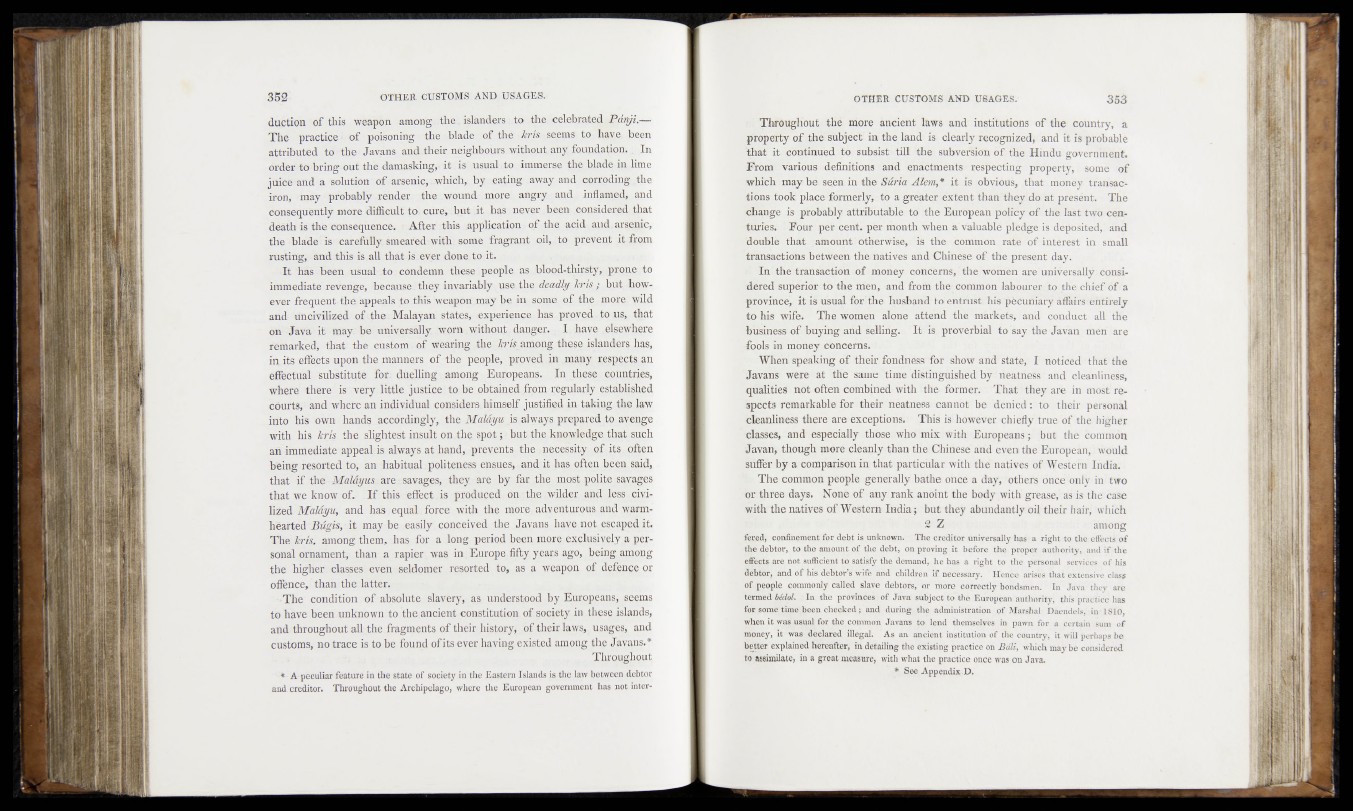
duption of this weapon amongvthe. islanders to the/celebrated Pdnji.—*
The practice- of poisoning ^the iblade-. of thé - fo-fe.-jse.eins fo h a lb e e n
attributed to "the i Javans andf-their neighbours:withput anj^fQuji,clation> ^ In
order to'bring-biit-the damasking,, it is usual, to immerse thqfelade in line
juice-and a selution' of-arsenic,/which, by easing .away, and c o rd in g .the
iron,-may probably/render:; the .wound-jnorel. angvy and inflamed, and
consequ ently more difficult to, cure,a but :it has ■ never. been, cppsider edi that
death is the Consequence-. cAJter dshis -application - oj^tbg.. acid aud.arseqic,
the -bladeus careffilly. smeared »with. some fragrant oil, to prevent At^qm
rusting, - and this is tall that isièwer done. tout. _ -. (
• It has-been .usuaHto;condemn, theseJpeople as. blood-thirsty,,.prone.to
immediate revenge, • beeajisef.they invariably, use,the. d e a d l y -however
frequent.the.'appe^ls'to^thiS weapon.may be ».some of the,more yrild
and- uncivilized oftthe: Malayan states, experience, has .prpye.d^tq^us^ that
on-Java ifm ay .b e universally, .worn, withop£, dagger. s ,1 have ^elsewhere
remarked, that the custom of wearing the krkjgnpgg thê^eA.sl^nders.has,
in.its effects upon the manners of the people, proved,in .many .respects an
effectual substitute For: duelling, among Europeans. In these., cpj^ries,
where -there-' is>' very little justice! to. be jolffaipedjrpm regularly established
courts,’ and where an individual considers-,himself justified in;taking the,law
into his own h an d f accordingly, the Maléi/u is/alsfeays prepared to^ayenge
with his kris the slightest insult on.the^spot ; • but the knowledge^ that^uch
an immediate appeal.is always at .hand^prevents the-fpeeessityf ^ .j jt ^ ^ e n
being resorted to, an habitual.politeness ensues, -and)it.has,often.behti.said,
thatr if the Malayus. are ^ savages, they.-are by far .the most .pofftejsayages
that we know--bf. .If this -effect .is - produced^ onffhejwilder,,.apd^jld^ c jv i-
lized Maldyu, and has equal force with the more, edveritjoroqs and .warmhearted
Bugis,"it may-be easily-conqeived the Jayans have not^capedjit.
The forts, among them, .has for a long, period been:mpre<exclpMV^yfa personal
ornament, than a rapier, was, in, Europe.fifty years ago, beii^g apaong
the higher classes even seldomer resorted to, as a weapon of defence or
offence, than the.latter.
-The condition of absolute, slavery, as, understood by Europeans, se,ems
to have been unknown to the .ancient constitution ofisopjety in, these islands,
and throughout .all the . fragments of their history, 'o f their la^s, usages, and
customs, no trace is to be found of its ever having existed among the Javans.*
Throughout
# A peeuliar feature in the state of society in the Eastern Islands is the law between debtor
and. creditor. Throughout the Archipelago, where the European government has not inter-
- Throughout the more ancient laws and institutions of the country, a
property of the’subject' in the land is clearly recognized, and it is probable
"that it continued to subsist till the subversion of; the Hindu government.
From ! various definitions and enactments respecting property, some of
which may be seen in the Stiria Alem,* it is obvious, that money transactions
took place-formerly, to a greater extent than they do at present. The
change is probably attributable to the European policy of the last two centuries.
Four per cent, per month when a valuable pledge is deposited,' and
'double that ,amount ! otherwise, is the common rate • of interest in small
transactions between- the natives and Chinese o f the present day.
fit In!the transaction.of money concerns,‘the women are’universally consi-
•dered superior to the men, and from the common labourer, to the chief of a
province, it is usual for the husband to'entrust his pfecuniary-affairs'entirely
to his wife. The women alone attend the markets, and conduct all the
business of buying and selling. I t is proverbial to say the Javan men are
•fools in money concerns.
When speaking of their fondness for show and state, I noticed that the
Javans were a,t the same time distinguished by neatness and cleanliness,
qualities not often combined with the former. . That they are in most respects
remarkable for their neatness cannot be denied: to their personal
cleanliness there are exceptions. This is however chiefly true of the higher
classes, and especially those who mix with Europeans; but the common
Javan, though more cleanly than the Chinese and eve» the European, would
suffer by a comparison in that particular with the natives of Western India.
T* - The common people generally bathe once a day, others once onlv in two
or three days. None of any rank anoint the body with grease, as is the case
with the natives of Western India j but they abundantly oil their hair, which
2 Z among
fered, confinement for debt is unknown. The creditor universally has a right to the effects of
the debtor, to the amount of the debt, on proving it before the proper authority, and if the
effects are not sufficient to satisfy the demand, he has a right to the personal services of his
debtor, and of his debtor’s wife and children if necessary. Hence arises that extensive
of people commonly called slave debtors, or more correctly bondsmen. In Java they are
termed bidol. In the provinces of Java subject to the European authority, this practice has
for some time,been checked; and during the administration of Marshal Daendels, in- lfflO,
when it was usual for the common Javans to lend themselves in pawn for a certain sum of
money, it was declared illegal. As an ancient institution of the country, it will perhaps be
better explained hereafter, in detailing the existing practice on Bdli, which may be considered
to assimilate, in a great measure, with what the practice once was on Java.
* See Appendix.D.